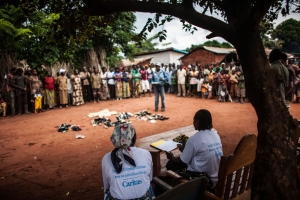By Valerie Kaye
“I was lucky,” said Thierry Diacro Lzila, a farmer in Ndangala, a village 40 km outside of the Central African Republic capital, Bangui. “I was in the church when the fighters arrived to search our homes. I was able to hide my tools.”
Rebellions and coups are not uncommon in Central African Republic. When a coalition of local and foreign troops called Seleka seized power in March, most people thought it would only be a matter of weeks until order was restored.
But their hopes have been dashed. The whole country is still in crisis. Over 300,000 people have been forced from their homes, many hiding in the bush or camped out in churches.
More than a million people don’t have enough to eat. Crops haven’t been planted, meaning the hunger crisis could get worse in a country where 8 out of 10 live off the land.
“It’s worse than we thought,” said Thierry. “ “I haven’t been able to plant at the right time. Instead of working the land, we have to hide while they loot, kill and steal. I live in fear.”
Jeanne Zongafro is a widow who struggles to feed her family, including 13 grandchildren. Seleka seized her tools in a raid. “Thanks to Caritas I was given new hoes,” she said. “And with these plant cuttings I’ve received I will be able to grow cassavas for my whole family.”
Sr Flora Guerekopialo of the diocesan Caritas, Caritas Bangui, works with villages at risk like this. “We give aid to groups of 20 people rather than individuals to ensure all the community’s needs are covered.”
Nancy Galaché has a big smile that masks many worries. She grows beans and cassavas, but is frightened to go to the fields. “They killed a farmer nearby,” she said. “We never know when they’ll arrive. When we hear a car, we hide.” It means the amount of money she can earn has fallen by a third.
Nancy isn’t the only one strapped for cash. The government put in place by Seleka has only been able to pay state employees like teachers, civil servants and doctors two out of seven months pay.
“My husband is a teacher,” said Nancy. “So we have very little on because he hasn’t been paid properly. That’s why we’re reliant on Caritas aid.”
Over 450,000 children are out of school, either because the school has been looted or torched, or turned into a barracks for Seleka, or the teacher in hiding.
“What makes me sad is that my children do not go to school,” said Jeanne. “I would like to share with them my knowledge for the future but for that we need a return of peace.”

